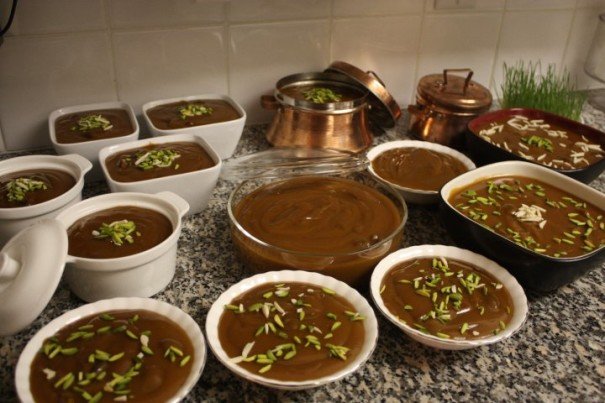
It’s Better in Uzbek

It’s Better in Uzbek
Okchai in Uzbekistan
The New Year has come to Mitan.
A woman in a kerchief is on her knees, clapping flour from her hands. Another is in the kitchen, crisping thin dough into kok-samsa. A few more take turns stirring what will, after thirteen hours’ effort, become sumalak: an earthy, caramel-thick mixture of wheat grass, seeds, and pebbles.
Three girls toddle along the courtyard in national dress so bright it is almost neon, demanding my phone for photographs, giggling as they tear it from my hands. After all, tourists come rarely to this village, which is a two hour drive from Samarkand. They’re in their Nawruz finest: I should commemorate them.
And the men stand in a corner, pouring clear liquid from a teapot.
My guide Vladimir explains.
“If you’re out to a banquet with your elders, you want to drink, right? But you don’t want your elders to see you drinking. So you quietly ask the waitress to bring you okchai: white tea.”
It’s simple, says Vladimir. You drink as much vodka as you like, and your parents or grandparents pretend not to notice.
Not that anyone would mind if they did. Here, as in many former Soviet countries, vodka is plentiful and as cheap as bottled water: not to mention a necessary harbinger of future friendshino. Although Uzbekistan is predominately Muslim, the prevailing regime—Islam Karimov, in power since Uzbekistan’s independence in 1991, is what locals euphemistically term “our first and last President”—is an almost fanatically secularist one. Karimov’s claim to power rests in part on his insistence that he is the only thing keeping Uzbekistan from devolving into a fundamentalist Islamic state.
Uzbekistan’s vodka consumption, ultimately, tends toward Moscow rather than Mecca. But the the teapot charade remains: so much so that Okchai has lent its name to one of Uzbekistan’s cheaper vodka brands.
Vladimir pours out more shots: for me, for him, for his colleague, Davron (who has only recently stopped insisting upon going by Gérard, as in French actor Depardieu, a close associate of the Karimov clan).
A few shots of okchai and Davron—dressed like a Sufi dervish, false beard and all—is ready to tell me a classic Soviet Uzbek joke, which he does in a dizzying combination of English, Russian, Uzbek, and French.
“There is man. In cafe. ‘I am Buffalo. Buffalo Bill.’ He wants to take tri shots from bottle.”
Vladimir murmurs something in Russian.
“Not drink shots. Gun. Bang. He cassez tri bottles, one shot. Then Russian man: ‘you think you cassez three bottles, one shot? I faire l’amour with tri women, one time.” He pauses for effect. “Chernobyl.” He wanders off, convulsing with laughter, the cup still in his hand.
Vladimir, red-faced, is left to explain the joke to me. It’s a play on American military power, a missile that can hit three targets at once; the Russian man, his member malformed by the after-effects of Chernobyl, can satisfy just as many women.
“It’s better in Uzbek,” Vladimir explains.
The men and I share another round of okchai. The women keep on stirring the sumalak, pouring the oil for the pilaf, laying out the cloves and the cardamon for a less noxious kind of tea.
The woman with the flour comes into the courtyard. On her knees she begins to knead the dough, starting the rhythm with her fists.
Everybody starts clapping, singing.
We empty the teapot.